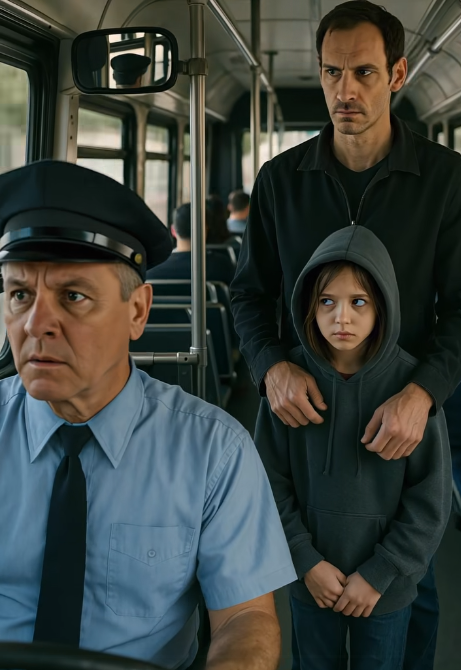A tall man boarded the bus that morning, the kind of figure that immediately drew attention — broad shoulders, long legs, moving with a strange rigidity, almost like he was carrying something heavier than his own body. Behind him, a little girl followed, about seven or eight years old, dwarfed by the oversized hoodie she wore, her small sneakers scuffing the floor as she walked. He wasn’t holding her hand, as most adults would — he gripped her wrist with a pressure that spoke of control, fear, and coercion. The way he held her made her small movements hesitant, almost mechanical, as if she were trying to shrink herself into nothing. I watched them through the rearview mirror, a familiar tension crawling up my spine. My gut screamed at me: this is wrong. Terribly, painfully wrong.
The morning had begun like any other. The sun blazed over the city streets, turning the asphalt into a mirror of heat. I had started the bus engine, checked the mirrors, and turned on the air conditioning to battle the growing heat inside the vehicle. I had gone through the same motions countless times: route sheets, passenger checks, engine sounds. Routine. Predictable. But that routine shattered in an instant as the bus doors slid open.
The tall man entered first, moving with an unnerving urgency. Every step seemed calculated, every glance over his shoulder tense, like a predator aware of unseen eyes. Behind him, the girl shuffled, tiny shoulders hunched, eyes cast down, avoiding every gaze that could have connected her to the outside world. Something inside me tightened, not fear, but recognition — years of experience, training, instinct, all screaming that this child was in danger.
The bus filled with its usual morning symphony: phone conversations punctuated with laughter, the rustle of bags, the occasional shout from children seated near the back. And yet, amidst the clamor, I heard it — soft, faint, almost lost among the noise: a whisper, delicate and terrified:
— Please, help me.
Time slowed. My pulse raced, every second stretching into a silent eternity. I had one chance, one choice, and I could not make a mistake. Panic would have been a death sentence for subtlety; I could not afford it.
I watched them carefully in the mirror. The man bent slightly toward the girl, his lips close to her ear, murmuring something that made her flinch violently. My hands tightened on the wheel as anger coiled in my chest like a living thing. The child’s vulnerability hit me like a physical blow, and every fiber of my being knew that action had to follow observation — but with precision.
At the next bus stop, I activated the radio with quiet urgency:
— Possible abduction. Route 52, heading south. Requesting immediate backup.
I maintained my calm exterior, opening the doors for other passengers as if nothing were wrong. The man noticed my attention lingering on them, his movements twitching, eyes darting to the mirrors with growing suspicion.
— Hey, — he barked, harsh and clipped, — keep your eyes on the road.
I nodded, smiled, and said nothing. But inside, I was calculating every move, anticipating his reactions, and preparing the trap that would save this little girl.
Minutes crawled by. Each stop stretched like hours as I maneuvered the bus along streets that edged closer to a police station. I created the illusion of a routine “technical stop,” announcing to the passengers:
— Everyone off, — I said loudly, forcing cheer into my voice. — Brake check, five minutes.
As the doors slid open, the man instinctively moved to shepherd the girl off the bus. That’s when two uniformed officers came running up the sidewalk, responding to my call. He froze for a split second — too late. They tackled him to the ground, his strength and momentum no match for trained law enforcement.
The girl stood on the sidewalk, trembling, confusion and relief mingling in her wide eyes. She looked up at me, her voice a fragile thread:
— Thank you.
I exhaled fully for the first time that morning, relief washing over me in waves. A single word had carried the weight of salvation, not just for her day, but for her life. Watching her wrap her tiny arms around the officer’s hand, feeling the tension drain from her posture, I realized that instinct and vigilance could create miracles, even in the mundane routines of a city bus.
The tall man was handcuffed, led away by the officers, his protests lost in the surrounding morning bustle. The girl, still clutching the hem of her hoodie, began to speak softly, more to herself than to anyone else, repeating reassurances like a mantra:
— I’m okay. I’m okay.
And I knew, then, that the world could still hold hope. That even in the ordinary rhythm of daily life, vigilance, courage, and careful observation could prevent tragedy. That morning, I had been the silent guardian, a quiet protector whose presence mattered more than words could convey.
Later, as the bus emptied and I resumed my route, the city seemed different. Streets felt charged with possibility, the sun’s heat a reminder of life continuing, moving forward. But inside me, a quiet satisfaction lingered — a sense that, for one little girl, the world had tilted back toward safety. And sometimes, that was enough.
